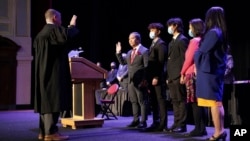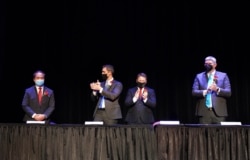A refugee who survived the Khmer Rouge's brutal rule has become the first Cambodian American mayor in the United States.
Sokhary Chau, a city councilor in Lowell, Massachusetts, was unanimously picked by his council peers to assume the legislative body's top post on Monday. He also became the city's first Asian American mayor.
"God bless America, right? I was a refugee, now I'm mayor of a major city in Massachusetts," the 49-year-old, who works for the U.S. Social Security Administration, said after being officially sworn in. "I don't know if that could happen anywhere else in the world. I'm still trying to absorb it."
Chau, in his inaugural remarks, reflected on his family's perilous escape from Cambodia and the former industrial city of Lowell's deep immigrant roots.
Located on the Merrimack River near the New Hampshire state line, Lowell was an early center of America's textile industry, drawing waves of European and Latin American immigrants over generations.
Today, the city of more than 115,000 residents is nearly 25% Asian and home to the nation's second-largest Cambodian community.
"As a proud Cambodian American, I am standing on the shoulders of many immigrants who came before me to build this city," Chau said Monday before a crowd that included his wife and two teenage sons.
Chau recounted how his father, a captain in the Cambodian army, was executed by the communist Khmer Rouge in 1975 during the country's civil war.
He said his mother, who died last year, managed to keep her seven children alive for four years, surviving "landmines, jungles, hunger, sickness and uncertainty" to deliver them safely to the U.S.
Chau said America may not have "streets paved with gold" as his family imagined while living in refugee camps, but it's a land where democracy is possible because of "systems of checks and balances" and principles like fairness, equality and transparency.
In an interview later, Chau said he was around 9 years old when his family initially settled in Pittsburgh, Pennsylvania, with the help of the Catholic Church — an experience that prompted the family to convert to Christianity.
They made their way to Lowell's growing Cambodian community in the mid-1980s, where some of his older siblings immediately set to work in local factories.
Chau, however, continued his studies and eventually earned a scholarship to Phillips Academy, an exclusive boarding school in nearby Andover. He went on to Macalester College in St. Paul, Minnesota, where he studied economics and political science, also on a scholarship.
Before running for office, Chau said he worked mostly in financial services, including running a mortgage lending company in Lowell with his wife before the housing market crashed in the early 2000s.
Chau's election follows the ascendance of new Boston Mayor Michelle Wu, whose parents immigrated to the U.S. from Taiwan. She was sworn in last November as Boston's first woman and first person of color elected to the post.
Chau is also among the growing list of Cambodian American officeholders in Massachusetts: at least two other city councilors, a school committee member and two state lawmakers, all from Lowell, according to Vannak Theng, president of the Cambodian Mutual Assistance Association of Greater Lowell.
But while Cambodian Americans served on local boards and state legislatures nationwide, none were elected mayor, according to the Asian Pacific American Institute for Congressional Studies, a Washington nonprofit that helps Asian Pacific Americans pursue public office and maintains a listing of current officeholders.
In fact, Long Beach, California, home to the nation's largest Cambodian community, only elected its first Cambodian American city councilor in 2020, the organization noted.
Chau's election also comes on the heels of a federal court lawsuit that argued Lowell's election process violated the voting rights of minority residents, who comprise nearly 50% of its population.
A recent settlement in the case prompted the city to change its election process, starting with the 2021 elections. The result was the city's most diverse class of officeholders, said Oren Sellstrom, litigation director at Lawyers for Civil Rights, a Boston group that brought the 2017 suit.
"Just four years ago, the city's elected officials were all white and largely unresponsive to the needs of the city's communities of color," Sellstrom said. "This historic change in the city's power structure would never have been possible under the old electoral system."
To be sure, the mayoral office in Lowell is largely ceremonial.
The city, about 30 miles (50 kilometers) north of Boston, is run by a city manager picked by the council. The mayor is effectively the council president, leading its meetings and also serving as chair of the city's school committee.
Still, Chau acknowledged his election's significance to the wider Cambodian diaspora, calling on others to step up in their communities.
"We can no longer be just victims," he said as he closed his inaugural remarks. "It is our time now to be leaders and to succeed."





